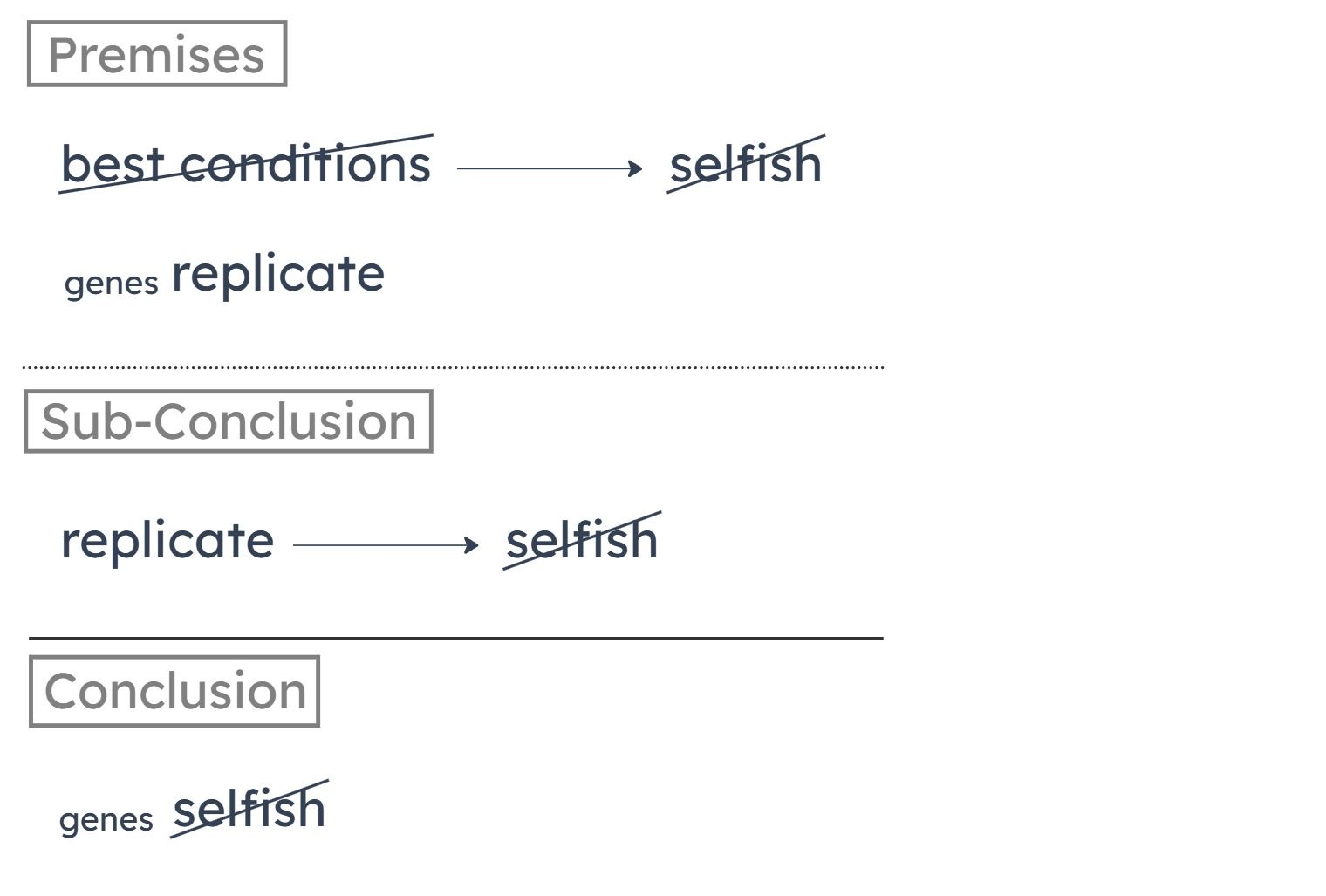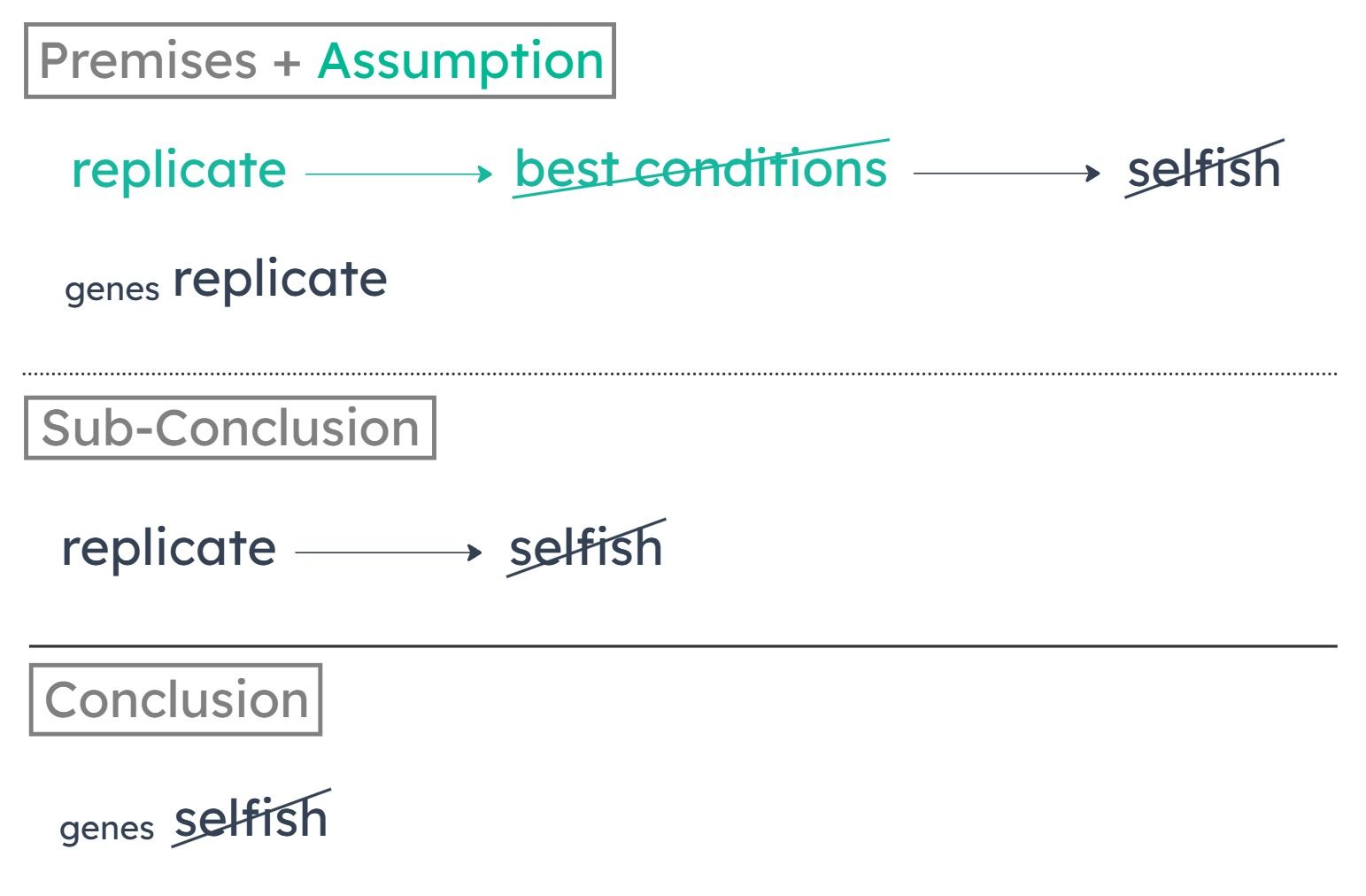LSAT 131 – Section 1 – Question 19
LSAT 131 - Section 1 - Question 19
December 2009You need a full course to see this video. Enroll now and get started in less than a minute.
Target time: 1:06
This is question data from the 7Sage LSAT Scorer. You can score your LSATs, track your results, and analyze your performance with pretty charts and vital statistics - all with a Free Account ← sign up in less than 10 seconds
| Question QuickView |
Type | Tags | Answer Choices |
Curve | Question Difficulty |
Psg/Game/S Difficulty |
Explanation |
|---|---|---|---|---|---|---|---|
| PT131 S1 Q19 |
+LR
+Exp
| Sufficient assumption +SA Conditional Reasoning +CondR Link Assumption +LinkA | A
1%
156
B
91%
166
C
6%
157
D
1%
155
E
1%
155
|
138 146 154 |
+Medium | 147.383 +SubsectionMedium |
J.Y.’s explanation
You need a full course to see this video. Enroll now and get started in less than a minute.
Summary
The geneticist first concludes that replicating is not selfish, and from this ultimately concludes that “selfish” isn’t an accurate label for genes. Why isn’t replicating selfish? Because to be selfish, you must be bringing out the best conditions for yourself.


Missing Connection
If we can validly draw the geneticist’s sub-conclusion (replicating is not selfish), then we have an automatic ticket to her conclusion. The only support provided for the sub-conclusion is that bringing about the best conditions for yourself is necessary for selfishness. To validly draw the geneticist’s sub-conclusion, we need to know that replication does not bring about the best conditions for oneself.
A
Bringing about the best conditions for oneself is less important than doing this for others.
Weighing importance of one thing versus another doesn’t help us conclude that replicating is not selfish. (A) only tells us that selfishness is linked to something less important than helping people.
B
Creating replicas of oneself does not help bring about the best conditions for oneself.
This means that replication fails a necessary condition of selfishness, so we can now validly draw the sub-conclusion (replication is not selfish). Since replication is the gene behavior that led to the “selfish” label, we can conclude that it isn’t a good descriptor for genes.


C
The behavioral definition of “selfish” is incompatible with its everyday definition.
The conventional definition of “selfish” is irrelevant. It does not support a conclusion that replication is not selfish.
D
To ignore the fact that self-replication is not limited to genes is to misunderstand genetic behavior.
This tells that replicating behavior doesn’t only occur in genes. This does not help us to conclude that replicating is not selfish, or that genes are not selfish.
E
Biologists have insufficient evidence about genetic behavior to determine whether it is best described as selfish.
Lack of knowledge doesn’t change truth. Whether people feel like they can speak to a certain thing doesn’t change whether it is true or not.
Additionally, we are speaking specifically about genes and replication, not genetic behavior overall.
Additionally, we are speaking specifically about genes and replication, not genetic behavior overall.
Take PrepTest
Review Results
LSAT PrepTest 131 Explanations
Section 1 - Logical Reasoning
- Question 01
- Question 02
- Question 03
- Question 04
- Question 05
- Question 06
- Question 07
- Question 08
- Question 09
- Question 10
- Question 11
- Question 12
- Question 13
- Question 14
- Question 15
- Question 16
- Question 17
- Question 18
- Question 19
- Question 20
- Question 21
- Question 22
- Question 23
- Question 24
- Question 25
Section 2 - Logical Reasoning
- Question 01
- Question 02
- Question 03
- Question 04
- Question 05
- Question 06
- Question 07
- Question 08
- Question 09
- Question 10
- Question 11
- Question 12
- Question 13
- Question 14
- Question 15
- Question 16
- Question 17
- Question 18
- Question 19
- Question 20
- Question 21
- Question 22
- Question 23
- Question 24
- Question 25
- Question 26
Section 3 - Logical Reasoning
- Question 01
- Question 02
- Question 03
- Question 04
- Question 05
- Question 06
- Question 07
- Question 08
- Question 09
- Question 10
- Question 11
- Question 12
- Question 13
- Question 14
- Question 15
- Question 16
- Question 17
- Question 18
- Question 19
- Question 20
- Question 21
- Question 22
- Question 23
- Question 24
- Question 25
Leave a Reply
You must be logged in to post a comment. You can get a free account here.